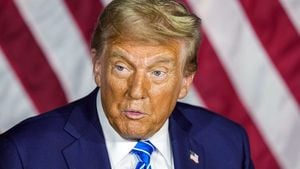Elon Musk, the billionaire known for his ambitious ventures with companies like Tesla and SpaceX, faces serious legal challenges related to his compensation as the lead at Tesla. The crux of the issue revolves around whether Musk's massive payday was justified, and if it adhered to corporate governance rules, especially considering the company's fluctuATING performance amid the turmoil of the COVID-19 pandemic and recent economic pressures.
Back in 2018, Tesla unveiled Musk's compensation plan, which was framed as one of the most lucrative founder packages at the time. The deal involved Musk earning up to $55 billion, based on milestones related to the company’s market capitalization and operational performance. Although it initially raised eyebrows, especially with Musk's ambitious benchmarks, he was seen as someone uniquely capable of steering Tesla toward those lofty goals.
Fast forward to today, and stakeholders are raising alarms. A core contention is whether Musk met the performance targets set forth when the compensation package was announced. Critics argue the substantial rewards he received do not correlate with Tesla’s performance, particularly as the market cap had seen both meteoric rises and sharp downturns.
Legal scrutiny intensified as stockholders began to question the metrics used to evaluate Musk’s performance. Legal analysts suggest the heart of the dispute is rooted deeply within the ethics of corporate governance. The lawsuit makes claims about potential breaches of fiduciary duty, asserting Musk's enormous payout was unwarranted and disproportionate to the value he brought to shareholders during certain periods.
This isn’t the first time Musk's financial maneuvers have stirred controversy. His social media activity has led to significant scrutiny from regulators. For example, Musk’s tweets often tilt markets, causing significant shifts, such as when he tweeted about taking Tesla private at $420 per share, which prompted lengthy legal battles with the SEC. This pattern of behavior suggests Musk operates on the edge, continually challenging both regulatory norms and shareholder expectations.
The board of directors is also feeling the heat. Some insiders claim they may have acted improperly by granting Musk the compensation package without adequately addressing concerns or dissent among Tesla’s shareholders. Critics argue the directors have responsibilities to all stakeholders and should help establish frameworks for executive pay correlated with realistic performance benchmarks.
Tesla's overall market performance provides substantial fodder for those questioning the fairness of Musk's pay. Over the past few years, for example, Tesla shares have swung wildly, reflecting both investor exuberance and skepticism. Stock prices surged to record highs, with Tesla briefly becoming the most valuable car manufacturer globally, only to see declines as market conditions shifted and the competitive EV market became increasingly crowded.
Market analysts suggest the forthcoming legal battles will not only hinge on the specifics of Musk’s deal but also broader cultural attitudes toward executive compensation. Are billion-dollar payouts appropriate even when performance is inconsistent? Stockholders are demanding accountability, with many hoping the outcome could set precedents for future executive compensation practices within the tech industry.
Stakeholders are gearing up for what promises to be an intense courtroom battle. Legal experts are expressing their views on how this case could shake up the corporate world, with calls for reforms to how executive pay is structured. It’s starting to look like we’re not just witnessing the examination of Musk’s individual actions, but rather, a potential shift on how reward systems are structured across the board.
Musk remains defiant, defending his leadership and decisions as imperative for ensuring Tesla's position as a leader within the EV sector. Many within the automotive and tech industries agree – to challenge the status quo can sometimes attract legal backlash, particularly when one’s success is so publicly visible. At this juncture, it is unclear how these legal challenges will affect Musk's overall standing but one thing is for sure, it will be closely watched.
So as the legal maneuvers commence, one has to ask: Will this case redefine the standards for executive compensation, or will it merely be seen as another hurdle for Musk to navigate? The spotlight is firmly on Tesla’s practices, and the outcomes of these trials could resonate far beyond the walls of the courtroom.



